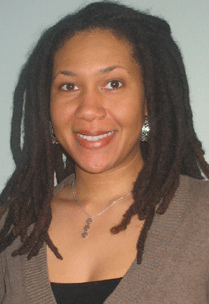 Tahira Mahdi
Tahira Mahdi
Psychology
“Myopia and the Need for Cognition in a Community Sample of Adults”
Faculty Mentor: Dr. Shawn Bediako
Need for cognition refers to the extent to which people enjoy and participate in effortful cognitive activities. This study is motivated by my observation that the classic definition of a “nerd” is very consistent with what the literature suggest are characteristics of a person who is “high in need for cognition”: both terms describe someone who enjoys solving complex problems and analyzing situations. Glasses, or need for vision correction, fit the prototype of such individuals who have been portrayed in popular media as conscientious and prone to engage in esoteric pursuits. Do people whose physical characteristics force them to attend closely to visual stimuli actually have a similar type of personality? A sample of 80 adults varying in age, educational background, and quality of vision will complete a brief demographic survey, the Need for Cognition Scale and two perceptual tasks. Significant group differences on the outcome measures in expected directions would indicate that individuals who are nearsighted possess a higher need for cognition compared to those who are not. The goal of this study is to provide evidence that personality traits – and the way we cognitively process information – may be uniquely related to physical characteristics.
How did you find out that you could do research in your field as an undergraduate?
I came to UMBC as a transfer student, and once I was accepted, I read the articles featured on UMBC’s homepage about the great things done by students, faculty, and even President Hrabowski. At Orientation, a speaker talked about Undergraduate Research Awards and I made it a goal to get one during my time at UMBC.
How did you decide on your research project?
My research idea, like many others in psychology, came from simple observation of real-life situations. Years before I started at UMBC, I noticed that a few of my friends who were very nearsighted had certain personality characteristics that seemed opposite of a few people I knew who were farsighted. In Dr. Blass’s Social Psychology class, I learned about the central and peripheral routes to persuasion and something clicked. I read more about the topic and discovered how need for cognition was related to the ideas I already had bouncing around in my head. The more I learned about need for cognition, the more I thought of nerds… and their stereotypes. Because I find UMBC to be a place where nerd can be a nerd, I knew the topic was worth studying.
Who did you seek out as a faculty mentor? How did you know that would be the right person? Was he/she easy to approach?
My advisor, Dr. Steven Pitts, recommended that I contact Dr. Shawn Bediako because of my interest in health psychology. I emailed Dr. Bediako to set up a meeting about working in his lab through the PSYC 397 Research Experience in Psychology course. Dr. Bediako emphasized that he expected me to be directly involved in a research project, from literature reviews up until a possible presentation at URCAD. After working with Dr. Bediako for a year through PSYC 397 and presenting at URCAD 2009, I felt that he was aware of my dedication to research and would be willing to mentor me on an independent project.
What courses or other experiences prepared you for this research project?
Before attending UMBC, I had a career in media that included television, radio, public relations, print journalism, and being a self-published author. Because I was trained to analyze audiences, study likes and dislikes based on demographics, and promote products/people, many social psychological concepts were very easy to grasp. I have always been interested in group stereotypes and media images, so it was natural to relate these ideas to my interest in nerds. Also, with my experience in speaking and presenting in front of audiences, I was very prepared for the oral presentations of my findings at URCAD 2009 and 2010.
What has been the hardest part of your research so far? The most unexpected?
I really thought that I would get all 80 of my participants on one day. I did all that I could to ensure it, but on the scheduled day, it rained! The hardest part was getting participants. Whenever I thought it would be easy to get people to participate, it was difficult; whenever I thought it would be difficult, it was easy.
What else are you involved in on campus during the time you worked on your research?
I was involved in off-campus community service activities pertaining to my self-published books.
What are your plans for after UMBC?
I am now now a Meyerhoff Fellow, starting UMBC’s HSP doctoral program in Clinical/Community and Applied Social Psychology. I am very proud that I will be receiving my Ph.D. at UMBC after having been so well-prepared for graduate study by the undergraduate research opportunities here!
What advice do you have for other undergraduates about the research opportunities at UMBC?
Please do not underestimate the gold mine of support and opportunities we have here at UMBC. Bask in the greatness of the atmosphere and learn from faculty and fellow students! Engage yourself in these awesome research opportunities, especially because the staff works hard to make sure that we have them. It will pay off, not just when telling a graduate program why they should let you in, but when you feel the excitement about your own ability and potential. It’s just good LIFE stuff.
 Tahira Mahdi
Tahira Mahdi